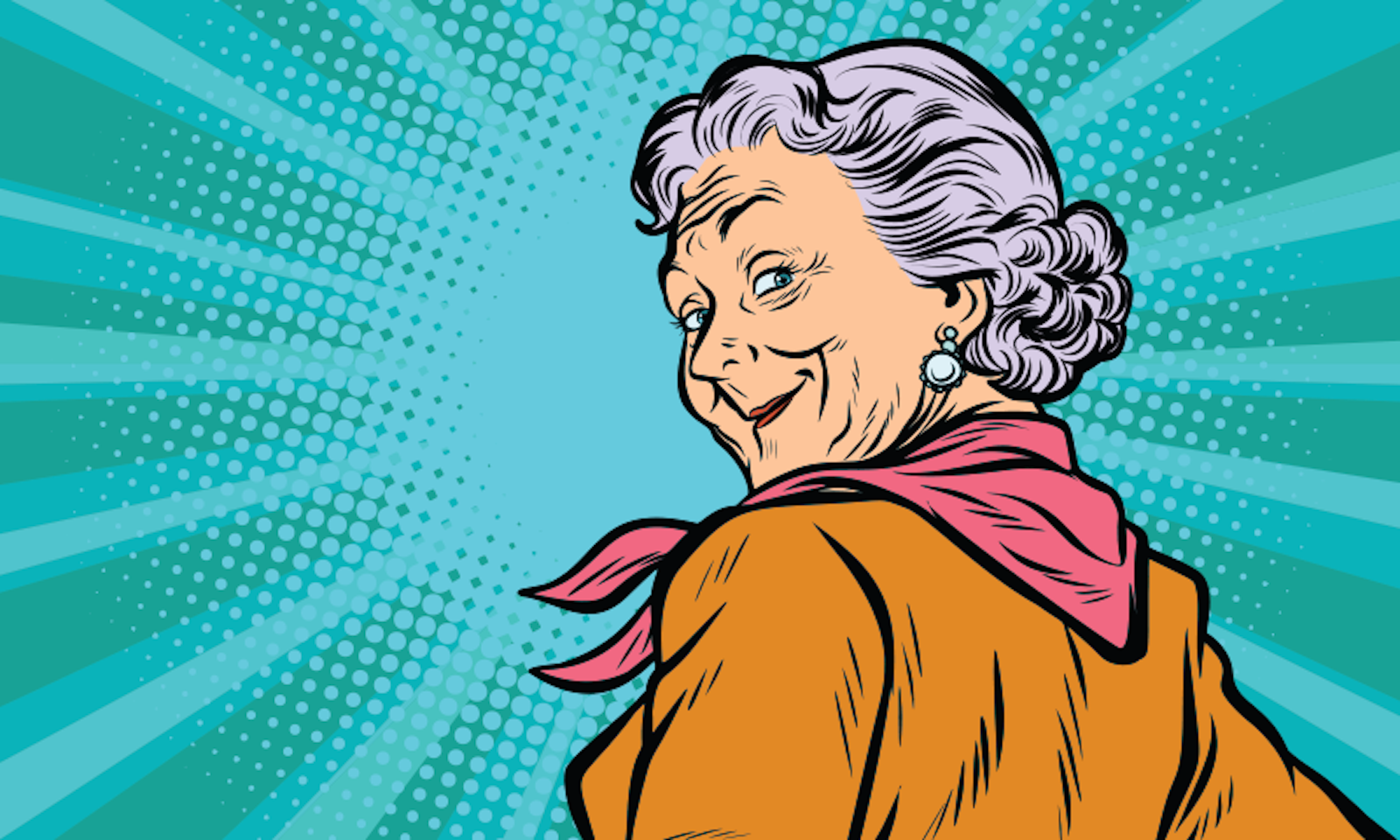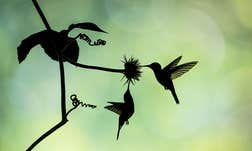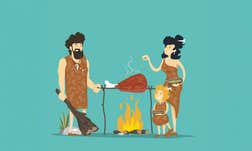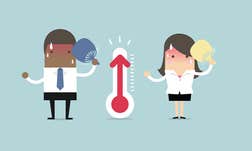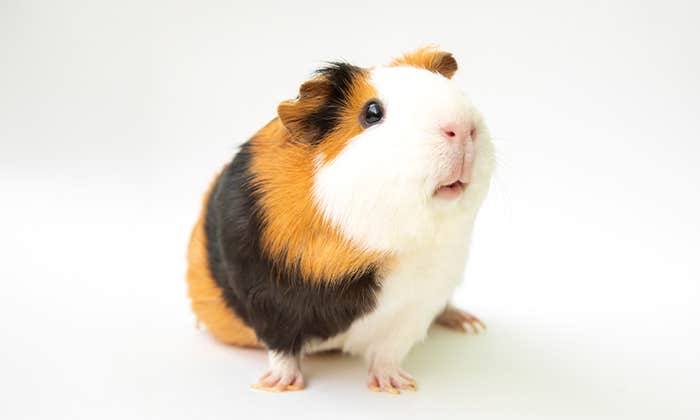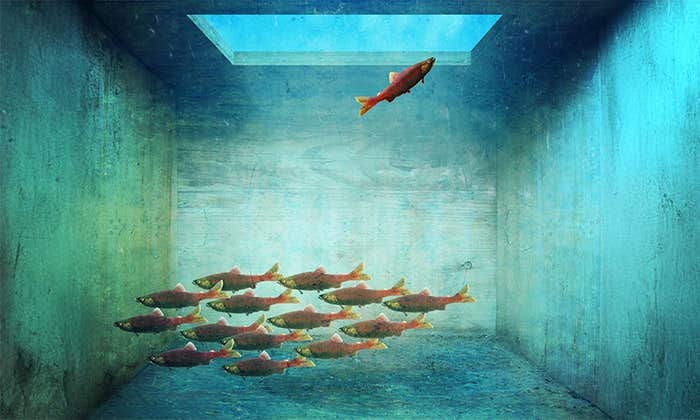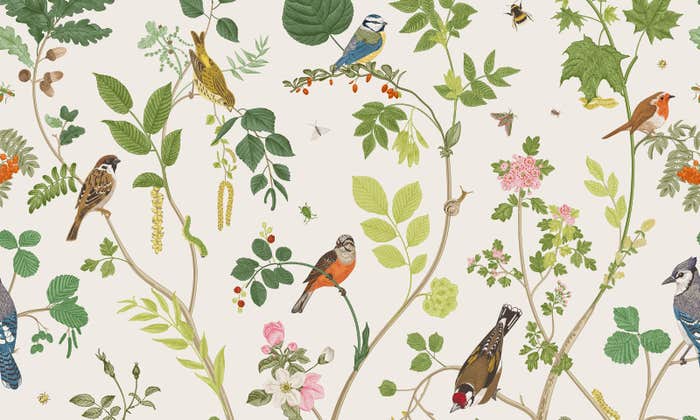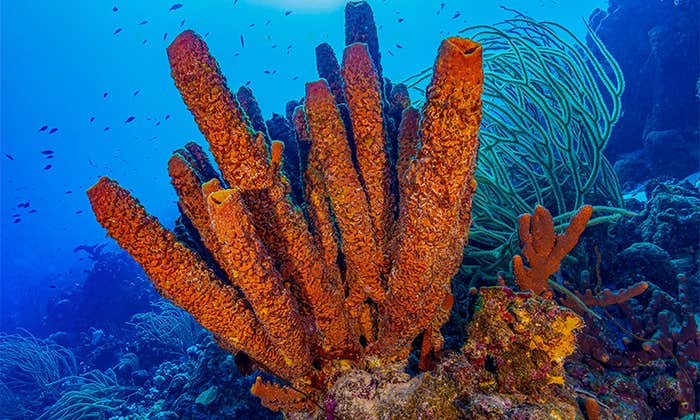Know thyself” is a terrific idea. It’s one of the Delphic maxims—alongside “certainty brings insanity” and “nothing to excess”—that you can find inscribed on the Temple of Apollo. Such knowing could well begin with an evolutionary conundrum: menopause. It’s as if natural selection took “nothing to excess” strangely to heart in the realm of human reproduction. Very few mammals—excepting short-finned pilot whales and possibly Asian elephants—experience anything like a prolonged life stage during which they are alive yet nonbreeding. So long as they draw breath, our fellow mammals release eggs. But not Homo sapiens.
Around age 50, women stop ovulating, a biological mystery because reproduction is the sine qua non of evolutionary success, and yet menopause occurs at an age when women often have a few decades of healthy life ahead of them. Men keep producing sperm (albeit fewer and less viable) into their eighth and even ninth decades. For women, it’s not about becoming unable to make eggs, since every girl is born with all that she will ever have, which await maturation and release. The “how” of menopause is well understood; it is brought on by a dramatic reduction in endocrine hormones, notably estrogen.
Female African elephants breed into their 60s, and blue whales, into their 90s.
But why has selection favored this rapid and consequential decline, causing women’s endocrine machinery to poop out when it does? What are the ultimate, evolutionary reasons? If you like mystery stories, you’re in for a treat. Mark Twain noted that it was easy to stop smoking; he’d done it hundreds of times. It’s easy to explain menopause; there are many hypotheses, albeit fewer than a hundred. There is now a leading candidate, the grandmother hypothesis, which I first described in Nautilus in 2016, and which has been reinforced by two new studies.
The anthropologists Raziel Davison and Michael Gurven published a paper in the Proceedings of the National Academy of Sciences, looking at foraging and food-sharing practices among wild chimpanzees, human hunter-gatherers, and horticulturalists, which underscored “the importance of elders.”1 They found that “intergenerational transfers of food and information in the complex, high-skill foraging niche typical of hunter-gatherers can select for longer lifespan.” A team of scientists from the University of California, San Diego and Princeton, led by postdoctoral researcher Sudeshna Saha, published a paper in Molecular Biology and Evolution showing that grandmothering might well have been an important driver of the evolution of certain genes that contribute to a healthy immune system, along with resistance to cognitive decline with age.2
There is no reason to suppose that age and reproduction are necessarily incompatible. Female African elephants breed into their 60s, and blue whales, into their 90s. If there were a reproductive payoff to making babies in one’s 50s, 60s, or 70s, you can rest assured that women would ovulate in their golden years. But they don’t. Perhaps, then, menopause is an incidental result of our increased life spans. In short, what if it’s an aberration rather than an adaptation, something that has arisen because our reproductive biology was tuned to prehistoric times when people simply didn’t live as long as they do today? After all, if most of our ancestors were dead before age 50, it is no surprise that our bodies haven’t evolved to make productive use of those tacked-on decades.
There is, however, a big problem here: Even in prehistoric times, many people lived beyond their sixth decade. Average life span was shorter in those times, but because infant and early childhood mortality was high, not because there were hardly any old people. If, for example, two newborn babies died for every person who survived to 75, the “average life span” would have been 25, as currently estimated for early humanity. Among today’s nontechnological hunter-gatherers who reach age 20, life expectancy extends about two decades beyond menopause. So why don’t they—and we—keep reproducing?
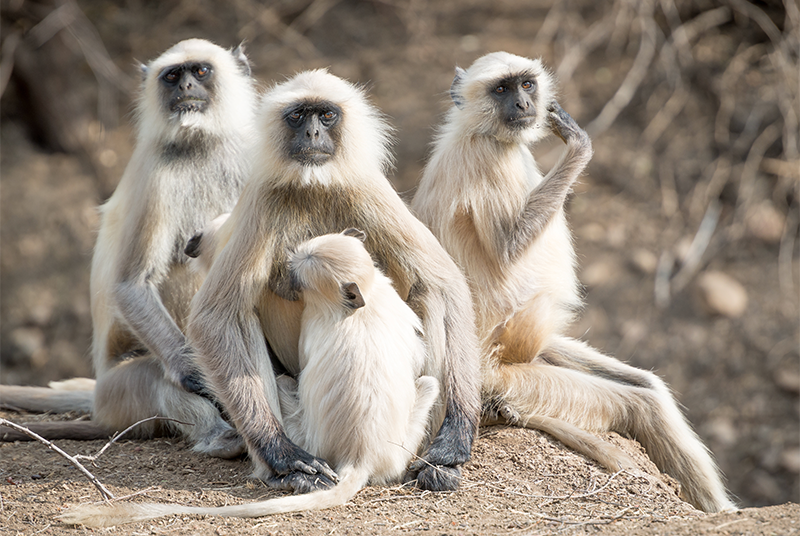
Maybe an older female body simply isn’t up to the rigors of pregnancy and lactation. Assisted reproductive techniques have proved that women in their 50s and even 60s can sustain pregnancy and bear healthy babies. So clearly the female infrastructure can be up to the task. Basic statistics, plus the “magic of compound interest,” further suggest that selection should have favored any individuals who gave it a try, if only because some would have succeeded, and these would have contributed disproportionately to succeeding generations. Natural selection should have favored women who attempted to bear just one more child, no matter how old they were and even if most of them died trying, because any such older mothers would be a step ahead of the non-reproducing competition.
Moreover, if menopause is simply the biologically mandated consequence of increased age, an accidental result of modern technology keeping our bodies going beyond their usual and allotted life span, then why is it merely a woman’s reproductive system that poops out? Why don’t the kidneys, heart, or liver throw in the towel? Looking simply at the debility of old age, evolutionary theory suggests that all systems should fall apart at about the same time. As soon as any one of them began to malfunction, selection would no longer operate to maintain the others.
Notably, it isn’t that all human reproduction ceases at menopause, but specifically women’s reproduction. Male menopause is a myth; certainly, it has nothing like the clear-cut biological specificity of its female counterpart. Although male fertility declines with age, it does so pretty much at the same pace as the aging of other organ systems, whereas female fertility and only female fertility stops with finality.
Enter a genuine contender, the prudent-mother hypothesis.
Women, not men, get pregnant, give birth, and lactate, with the costs falling entirely on them. Maternal mortality can be distressingly high. Paternal mortality? The phrase doesn’t even exist. In addition, as all bodies grow older, they become less viable and more breakable than their younger counterparts, so it shouldn’t be surprising that at some point, older women stop bearing children.
Even in prehistoric times, many people lived beyond their sixth decade.
The dilemma persists, however: Why should it matter to natural selection if women kept reproducing, or trying to do so, until they died in the process? After all, this is precisely what happens among nearly all other species, which typically breed unto the bitter end. It must somehow be the case that women who, having reached a certain age, desisted from reproduction ended up leaving more genetic descendants than did those who kept on keeping on. In the poker game of breeding—in which maximizing your fitness substitutes for maximizing your pile of chips—there is a payoff for betting successfully on one’s breeding potential.
There is a cost, though, to betting too high, illustrated by Jane Goodall’s famous chimpanzee matriarch Flo. Chimps don’t undergo menopause, and Flo bred into extreme old age. Her struggle to care for her last two offspring led to the death of both and to her own demise. On the other hand, it would be suboptimal to be excessively prudent and bet too low—that is, to quit reproducing too soon, underplaying one’s hand. You’ve got to know when to hold ’em, know when to fold ’em. The prudent-mother hypothesis is that menopause tells women when to fold ’em. But it’s not the only game in town.
In general, menopause begins at about the time when a woman’s children, born roughly two decades earlier, are themselves likely to become parents. That is, she may well be—or is about to become—a grandmother. The eponymous hypothesis is that by foregoing reproduction at a time when the cost of reproductive imprudence is rising, a middle-aged woman might also be freeing herself to contribute to the eventual success of her grandchildren, and thereby, of her own genes as well.
Worldwide, human grandparents in general, and grandmothers in particular, pitch in. Crucially, those who do so typically end up with more grandchildren than those who don’t. The grandmother hypothesis does not preclude prudent mothering, because once a mother is no longer encumbered with her own dependent children, it makes evolutionary sense that she would be inclined to help out with her kids’ kids, each of whom has a 25 percent probability of carrying any one of her genes.
Our species’ unusually long period of juvenile dependency may also be involved, as neediness would confer a special benefit to the assistance others render beyond the parental pair. Anthropologist Sarah Hrdy has proposed that humanity may well have evolved in the context of extensive cooperative parenting.3 And who would be more qualified, and also better positioned to gain biologically as a result, than grandmothers?
Hrdy tells of a particular langur monkey, “old Sol,” who had ceased cycling and thus was likely quasi-menopausal, in a sense. Sol was almost literally on her last legs when a strange adult male invaded the langur troop and attempted to work infanticidal mayhem. “It was Sol,” writes Hrdy,
who repeatedly charged this sharp-toothed male nearly twice her weight to place herself between him and the threatened baby. When the infanticidal male seized the infant in his jaws and ran off with him, Sol pursued the attacker and wrested the wounded baby back. … That an arthritic old female would become marginalized with age is scarcely surprising. More curious was Sol’s transformation from decrepit … to intrepid.4
It doesn’t diminish Sol’s courage to point out that by defending youngsters, some of whom could well be her own grandchildren, Sol and other warrior grandmothers may literally be justifying their own post-reproductive existence, or—to put it differently—their genes are generating their own payoff.
Studies by anthropologist Kristen Hawkes and her colleagues have found that among the Hadza, modern hunter-gatherers of Tanzania, the men hunt while the women gather and forage, and (ta-da!) the most energetic and productive are post-menopausal women.5 Sure enough, Hadza grandmothers give their bounty to their children and grandchildren, whose body weights vary directly with their grandmothers’ food-gathering efforts. A young mother, no matter how healthy and hard-working, is necessarily constrained while caring for a baby, so such assistance is nothing to sneeze at.
The technical term for cooperative breeding is alloparenting (allo = other) and its likely importance in our evolution should give us pause when we consider the extent to which modern Western societies—with their “nuclear family”—make it difficult and sometimes impossible for grandparents to provide the kind of social and biological contribution that was probably important for nearly all of our biological past.
How important, we cannot tell. But the basic pattern, in which devoted grandmothers contribute significantly to the success of their grandchildren, has been confirmed by anthropologists studying other human groups.6 All of this makes it increasingly likely that grandmothers owe their nonreproductive status to the payoffs that—at least in the past—they were able to convey, and the genetic recompense they received as a result. In short, women whose ovaries say “no” may well be saying “yes” to their genes.
We can conclude that evolution, as usual, knew what it was doing.
A hurdle to the grandmother hypothesis had been another evolutionary principle that is widely acknowledged to explain why bodies deteriorate with age: Once nonreproductive status has been reached (for whatever reason), bodies become invisible to selection, and so, evolution stops favoring their continued maintenance, which probably contributes to the debility of seniors, as well as greater vulnerability to disease. Insofar as this applies to our own species, it should be a strike against post-reproductive survival.
In their study, Davison and Gurven gathered extensive data on chimpanzees and on different human groups. Plugging their evidence into computer models, the researchers were able to uncover the “role of foraging ecology in shaping human life history evolution.” In particular, they were able to assess the ultimate reproductive benefits that post-menopausal human grandmothers—and, of course, their genes—can derive by helping to provide food for their grandchildren. This finding shows grandmothering can balance and to some extent even overcome evolutionary pressures that would otherwise work against the survival of post-menopausal women. It underscores the hypothesis that menopause contributes to the ultimate evolutionary success of menopausal women.
These results suggest that this evolutionary payoff can overshadow pressures that would otherwise produce rapid physical deterioration of nonreproductive individuals. Part of the mystery of menopause is that it occurs when women still likely have several decades of generally healthy life ahead of them. It’s now quite plausible that grandmothering is significantly responsible for the existence of those healthy post-reproductive years. Not only do grandmothers benefit via their genetic descendants, that payoff also benefits their own bodily health, at a stage of life when they would likely deteriorate even more rapidly than otherwise.
At about the same time Davison and Gurven published their results, the UC San Diego team showed via fine-tuned genetic analysis that humans possess DNA segments that to some degree repress cognitive decline in old age. Accordingly, it isn’t just grandma’s body that evolution helps keep healthy, but her mind as well. These results doubly support the grandmother hypothesis: A nonreproductive grandmother is not only able to be an evolutionary success via her grandchildren, but that success contributes to keeping her aged body alive and kicking.1
Of course, not all women become grandmothers, and among those that do, not all actively contribute to the well-being of their grandchildren, especially in the modern Western world where the generations often live some distance apart. The likelihood, however, is that grandmothering was prominent during more than 99 percent of our evolutionary past, which took place long before birth control and other options that currently give women control over their reproduction.
There is another reason to trust the grandmother hypothesis. The size of the human head at birth is constrained by the dimensions of the mother’s birth canal. So humans are born at an earlier stage of development than many other mammals, with a relatively smaller head and brain. Brain development, then, requires a prolonged childhood. Again, that’s where grandma enters the picture: to help ensure the health and development of children and their brains. In the grand scheme, she helped us evolve into modern humans.
All things considered, the grandmother hypothesis now looks quite robust. Menopause isn’t always welcomed by women, in part because it is typically accompanied by side effects, which can be severe. At present, however, we can conclude that evolution, as usual, knew what it was doing when it programmed women’s bodies to stop ovulating at a certain age. ![]()
David P. Barash is an evolutionary biologist who has specialized in animal behavior and is now emeritus professor of psychology at the University of Washington. His most recent book is Threats: Intimidation and its Discontents.
Lead image: Studiostoks / Shutterstock
References
1. Davison, R. & Gurven, M. The importance of elders: Extending Hamilton’s force of selection to include intergenerational transfers. Proceedings of the National Academy of Sciences 119, e2200073119 (2022).
2. Saha, S., et al. Evolution of human-specific alleles protecting cognitive function of grandmothers. Molecular Biology and Evolution msac151 (2022).
3. Hrdy, S.B. Cooperative breeders with an ace in the hole. In: Voland, E., Chasiotis, A., & Schiefenhoevel, W. (Eds.), Grandmotherhood: The Evolutionary Significance of the Second Half of Female Life Rutgers University Press, New Brunswick, NJ (2005).
4. Hrdy, S.B. Mother Nature: Maternal Instincts and How They Shape the Human Species. Ballantine, New York, NY (1999).
5. Hawkes, K., O’Connell, J.F., & Blurton Jones, N.G. Hadza women’s time allocation, offspring provisioning and the evolution of long postmenopausal life spans. Current Anthropology 38, 551-578 (1997).
6. Sear, R., Mace, R. & McGregor, I.A. Maternal grandmothers improve the nutritional status and survival of children in rural Gambia. Proceedings of the Royal Society B 267, 1641-1647 (2000).















